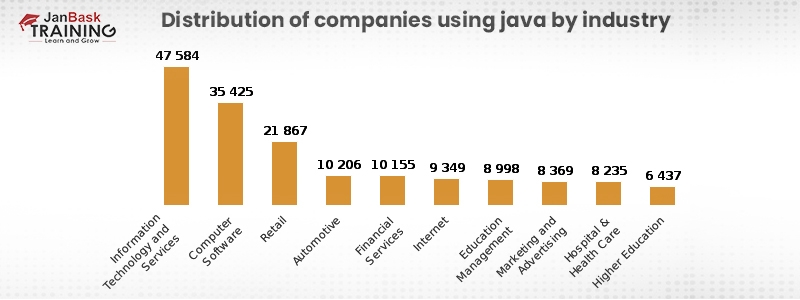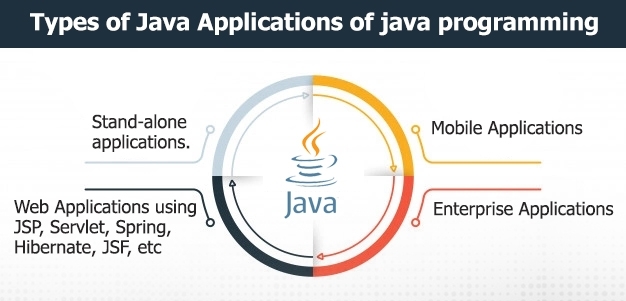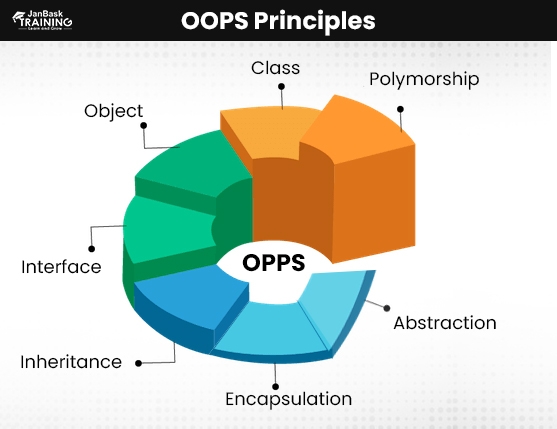25
JulInternational Womens Day : Flat 30% off on live classes + 2 free self-paced courses - SCHEDULE CALL
Do you know that there are more than 10 million Java Developers all over the world? Java is one of the most popular and in-demand programming languages. A number of software applications are developed using Java due to its leveraging features.
Though it is quite easy to learn Java, which is why this online Java tutorial is written for those who want to learn the basics of Java programming. Java has a huge number of classes and methods that are necessary for beginners to learn. Here in this blog, we have described only a few aspects of this language. Still, you may find many new advanced concepts in the Java language.
Through this object-oriented programming language, a number of real-world applications can be developed, which can help you get a better understanding. Get foundational to advanced Java skills with real-world project-solving experience with a credible Java online certification and training program.
In this Java tutorial guide for beginners, you will learn about various things including Java programming basics such as What is Java platform?, JVM, how to install Java, OOPS concepts, variables, class, objects, arrays, strings, command-line arguments, garbage collection, inheritance, polymorphism, interface, constructor, packages, etc. Moreover, you will also learn about advanced concepts such as switch-case, functions, multithreading, swing, files, API, Java Spring, etc., in this Java basic tutorial for beginners guide. Get a clearer vision of programming through our industry-specific Programming Certification Courses at JanBask Training.
Java Certification Training Online

Java is a high-level programming language that was originally developed by Sun Microsystem in the year 1995. It is a platform independent and object-oriented language. As the language is platform independent, it can run on any operating system including UNIX, Windows or Mac OS. Java language programs are based on the object-oriented concept that is described in this tutorial. There are three basic terminologies associated with Java that are JDK, JRE, and JVM.
JDK is known as the Java Development Kit. New applications can be developed, executed and compiled with JDK and even the existing applications can also be modified through JDK. On the machine where developers want to develop the applications, JDK must be installed. It further involves JRE and other development, debugging and monitoring tools.
JRE stands for Java RunTime, already developed applications can be executed by JRE. As the name suggests it only provides a runtime environment so new applications cannot be developed by JRE and existing applications cannot be modified as well through JRE.
JVM means Java Virtual Machine. It drives the java code and bytecode can be run through JVM. By converting the code into machine learning language the code gets executed.
If programming is what interests you, Java is the ideal career choice for you. Learn how to start a career in Java development with our blog.
Java forms the backbone of the internet. According to the data released by the United States Bureau of Labor Statistics, 35.35% of software developers use Java as their programming language. This is a high-level, object-oriented programming language that is widely used for the development of software applications in laptops, mobiles, data centers, etc. Thanks to its platform independence, it is one of the most sought-after programming languages in the I.T.domain.Start working on Java projects in real time and acquire hands-on experience before diving into the IT industry. Java is required in every sector of the industry. Check this infographic to know the companies using Java and their market share-

At compile time, it provides runtime verification and static type verification that makes it almost impossible to hack. Java is on the rise because of its multi-threaded capability. Top tech giants like Capgemini, Apple, Google, Mindtree, TCS, Oracle, HCL, and many more are searching for Java developers.
Enroll in JanBask Training to read more and nurture your skills with our professional certification courses.
A Java platform is a collection of programs that help programmers to run an application efficiently. It includes an execution engine, a compiler and a set of libraries in it. There are 4 types of Java platforms or editions that a beginner will get to learn here:
To set up the Java environment, if you haven't installed Java on your machine, then you may have to download it from the website of Sun Microsystem and Eclipse for better results. Prior to Eclipse installation, the Java environment must be set up and you should have it on your machine. You can also download Java as per your machine’s requirement.
Eclipse is not just an IDE but it is an entire development ecosystem that has four main components for Java application development such as:
The below-mentioned image shows the Java perspective window of Eclipse.

Eclipse perspective has the tools that are used to write a Java application. A new project must be started to write the new Java application.
Learn and excel in coding by reading this Java Learning & Certification Path.
Java Certification Training Online

Java is an object-oriented programming language that follows the concepts of OOPS as a structured programming language. OOPS follow certain principles that are implemented by Class, Object and other features of Java language such as Constructor, Abstraction, Encapsulation, Polymorphism, Inheritance, Interface and other. OOPS principles are listed below:

Java Programming Language Tutorial: Class
The class is a blueprint or prototype and objects which are created from this prototype as it contains functions and variables through which objects' behavior is described.
Following is an example of a Class declaration in Java:
Class Class_Name{ Member Variable Declaration Method Definitions }
Get your basics cleared in Java OOPS concept after reading our blog.
Java Programming Language Tutorial: Object
Object-oriented languages like Java, combine programs and data into objects that are defined as a self-contained entity. These objects have their own attributes and behavior with the following properties that are mentioned below:
Nurture your Java skills for a rewarding career ahead and prove yourself better than the rest.
Objects are instances of the Class. Following is the example of objects in Java programming:

Class Class_Name{ Void turnOn{} Public static void main (String [] args){ Class_Name Obj1=new Class_Name(); Obj1.turnOn(); } }
In the above example an object of Class has been created by the name Obj1 and through it the functions have been called. Methods can be of two types:
When a user defines any method, then it is known as a user-defined method, while those functions that are already defined in Java are known as Predefined functions.
When one class inherits the properties of another class, then it is known as inheritance. Like if we have two classes, one is parent class and the other one is derived class, which is the child class of the parent class, then the child class will inherit the properties of the parent class. Inheritance in properties increases the code reusability. Take the example where we have a super or base class named laptop and its subclasses or child classes like Apple, MacBook, Lenovo and others may extend Laptop Class to inherit its properties.
Gaining practical knowledge in Java with these projects will polish your future as a Java Developer. Also, learn about the roles and responsibilities that a Java Developer has to undertake in his career.
Polymorphism is made up of two words, one is poly means many and Morphos means shape. Java supports two types of Polymorphism one is runtime polymorphism and other is compile time polymorphism.
Here we can take the example of a class named Shape, which may be further divided into shapes such as circle, rectangle, triangle and many others.
If you are preparing for your upcoming Java interview, here are the top Java interview questions and answers for freshers and professionals.
To hide the implementation or internal details and show the functionalities to the user we can use the abstraction of Java. It is achieved by using Abstract classes and interfaces that are defined by using Abstract keywords.
Abstract Class has the following properties:
While an abstract method is a method that does not have any method implementation. Moreover, the abstract method can be used in a subclass by overriding its class.
Are you thinking about how much time it takes to learn Java? Get to know how long it takes to learn Java from our blog and be ready to commence your career with a jerk!
Encapsulation means binding data and code together in a single unit. Classes are the best encapsulation examples in which various methods, variables, and data are closed in a capsule that is known as class. To wrap all data together is known as encapsulation; it provides a secure environment for data.
Interfaces look like classes, but both are two different concepts of Java. Methods and variables can be declared in interfaces built by default, these methods are abstract by nature. 100
If you are preparing for your upcoming Java interview, here are the top Java interview questions and answers for freshers and professionals.
It is a Java programming platform that includes Java programming APIs like java. lang, java. io, java. net, java. util, java. sql, java. math and much more. Also, it includes various core topics such as OOPs, String, Regex, Exception, Inner classes, Multithreading, I/O Stream, Networking, AWT, Swing, Reflection, Collection, etc.
Java EE is an enterprise platform that is usually used to develop web and enterprise applications. Generally, it is built on top of the Java SE platform and hence includes various topics such as Servlet, JSP, Web Services, EJB, JPA, and much more.
It is a micro platform that is dedicated to mobile applications and is used to deploy portable code for embedded and mobile devices efficiently.
Getting hands-on experience with a Certification Course will give a boost to your resume. Get to know about the Java developer resume for freshers and experienced by reading this blog.
Java FX is a software platform that is required to create and deliver desktop applications, as well as it is a rich web application that can help you run files across a wide variety of devices. JavaFX has support for desktop computers as well as web browsers on Linux, macOS, and Microsoft Windows.
It is usually used to develop rich internet applications and uses a lightweight user interface API.
Java is a leading mainstream programming language that is easy to learn and is mostly required in development and programming profiles. Get end-to-end learnings in widely adopted software development programming language JAVA via our all-in-one JAVA Training online. Learn about Core Java, OOPS Concept, Hibernate framework, Java 2EE and many more from our immersive training program. There are more than 10 million Java developers and in the recent past, there has been a 47% increase in demand for Java professionals. Anyone can make an easy entrance to this profile but they need to have proven skills & certification in hand to be in it.
Java cannot be defined in a single article. There are lots of concepts that are associated with this object-oriented and platform-independent programming language that is required by a beginner to learn in java programming language tutorial. Along with that, you can even find examples as well in order to implement the above-mentioned Java features. Take Java Training and Certification.
Q1. Why should I learn Java?
Ans- Java is easier to learn, develop and debug than other programming languages. Secondly, it is object-oriented which allows the users to create reusable programs and codes. Because of its durability, ease of use, cross-platform adaptability, and security features, Java has become the most preferred programming language in the global tech industry.
Q2. What is the objective of the online Java course?
Ans- The objective of our online Java training is:
Q3. What will I learn in this course?
Ans- Here is all that you will learn:
Q4. What can I expect after this course?
Ans- After completing our Java certifications training online, you will achieve:
Q5. Why are Java certifications necessary?
Ans- Java certification online is important to target after online training in Java as it:
Q6. What are the prerequisites for joining this course?
Ans- There are no prerequisites for joining our Java online course with certificates. And, it is not a mandatory requirement to have a technical background to take our online Java training course. It’s always good to have some technical background or basic knowledge of programming but it's not mandatory. Any learner to professionals, with or without any technical experience/background can learn Java with ease. Because we cover everything around Java from basics to advanced, you don't have any issues correlating with our online Java training course.
Q7. Do you help with resume building or interview preparation?
Ans- Yes, we do help with drafting and reviewing your resume and interview preparation for the Java developer jobs. We have trainers who are from the direct working industry and they know what type of resume/CV the recruiters hiring for Java roles expect from the upcoming professionals. We organize mock interviews, in which our trainers ask questions about the concepts you have covered in our best online Java course. These questions are careful to note & grasp as they will be majorly asked during the actual interviews for Java jobs.
Q8. What learning benefits will I get from JanBask Training’s online Java course?
Ans- Our online training Java is not just about providing you with theoretical or practical knowledge for just qualifying for any competent certification exam, the purpose is to deliver you the knowledge that can be practically applied in real job roles. We serve you with the knowledge that's more around real-industry scenarios, case studies & practical assignments along with theoretical practice. We unveil you with real-time learnings that will make you ready with real-time use cases of Java.
Q9. What are the unique features of our programming courses?
Ans- At JanBask Training, we assure you,
Q10. Can I enroll in a single course?
Ans- Yes! To begin, click on the course you are interested in and register. You may register and complete the course to win a shareable certificate, or you can audit it to view the course materials for free. When you subscribe to a course as part of specialization, you are automatically registered for the entire specialization. Visit the learner dashboard to track your progress.
Through market research and a deep understanding of products and services, Jyotika has been translating complex product information into simple, polished, and engaging content for Janbask Training.

Cyber Security

QA

Salesforce

Business Analyst

MS SQL Server

Data Science

DevOps

Hadoop

Python

Artificial Intelligence

Machine Learning

Tableau
Interviews
Sanaya
Thank you for taking the time and sharing this information with us. It was indeed very helpful and insightful while being straight forward and to the point.
sanjay
Thank you very much, Your shared a wonderful post, Thanks for sharing the information!
Kaden Brown
One of the best tutorials i have found on Java Tutorial, must read posts for people looking to grow their career in Java.
Caden Thomas
This tutorial really helped me in getting familiar with java, at least good for beginner level.
Riley Walker
Does janbask provide java programming classes, if yes then please acknowledge once or how to reach their consultant to know about it.
Arlo Hill
Earlier I didn't know what encapsulation was, even though I tried to understand it many times but the way explained in this blog is really nice, now I understand it well. Thanks for such an informative and easy to understand blog.
markyjones99
I have a few more questions related to Java that I am trying to explore on google but not getting satisfactory answers, can anybody help me?